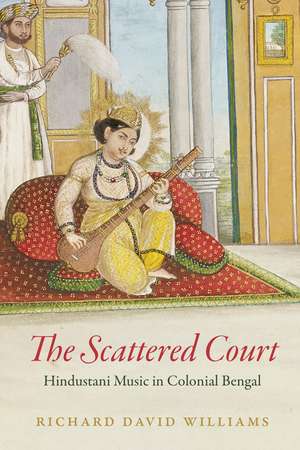The Scattered Court: Hindustani Music in Colonial Bengal: Chicago Studies in Ethnomusicology
Autor Richard David Williamsen Limba Engleză Paperback – 25 apr 2023
How far did colonialism transform north Indian music? In the period between the Mughal empire and the British Raj, how did the political landscape bleed into aesthetics, music, dance, and poetry? Examining musical culture through a diverse and multilingual archive, primarily using sources in Urdu, Bengali, and Hindi that have not been translated or critically examined before, The Scattered Court challenges our assumptions about the period. Richard David Williams presents a long history of interactions between northern India and Bengal, with a core focus on the two courts of Wajid Ali Shah (1822–1887), the last ruler of the kingdom of Awadh. He charts the movement of musicians and dancers between the two courts in Lucknow and Matiyaburj, as well as the transregional circulation of intellectual traditions and musical genres, and demonstrates the importance of the exile period for the rise of Calcutta as a celebrated center of Hindustani classical music. Since Lucknow is associated with late Mughal or Nawabi society and Calcutta with colonial modernity, examining the relationship between the two cities sheds light on forms of continuity and transition over the nineteenth century, as artists and their patrons navigated political ruptures and social transformations. The Scattered Court challenges the existing historiography of Hindustani music and Indian culture under colonialism by arguing that our focus on Anglophone sources and modernizing impulses has directed us away from the aesthetic subtleties, historical continuities, and emotional dimensions of nineteenth-century music.
| Toate formatele și edițiile | Preț | Express |
|---|---|---|
| Paperback (1) | 215.23 lei 3-5 săpt. | +15.34 lei 10-14 zile |
| University of Chicago Press – 25 apr 2023 | 215.23 lei 3-5 săpt. | +15.34 lei 10-14 zile |
| Hardback (1) | 617.39 lei 6-8 săpt. | |
| University of Chicago Press – 25 apr 2023 | 617.39 lei 6-8 săpt. |
Din seria Chicago Studies in Ethnomusicology
-
 Preț: 266.53 lei
Preț: 266.53 lei -
 Preț: 240.23 lei
Preț: 240.23 lei - 8%
 Preț: 564.74 lei
Preț: 564.74 lei -
 Preț: 184.64 lei
Preț: 184.64 lei -
 Preț: 103.15 lei
Preț: 103.15 lei -
 Preț: 200.20 lei
Preț: 200.20 lei -
 Preț: 214.61 lei
Preț: 214.61 lei -
 Preț: 185.07 lei
Preț: 185.07 lei -
 Preț: 184.18 lei
Preț: 184.18 lei -
 Preț: 185.14 lei
Preț: 185.14 lei -
 Preț: 207.69 lei
Preț: 207.69 lei -
 Preț: 390.87 lei
Preț: 390.87 lei - 23%
 Preț: 674.84 lei
Preț: 674.84 lei -
 Preț: 410.90 lei
Preț: 410.90 lei -
 Preț: 374.70 lei
Preț: 374.70 lei -
 Preț: 346.67 lei
Preț: 346.67 lei -
 Preț: 352.99 lei
Preț: 352.99 lei -
 Preț: 292.28 lei
Preț: 292.28 lei -
 Preț: 253.52 lei
Preț: 253.52 lei -
 Preț: 265.30 lei
Preț: 265.30 lei -
 Preț: 442.31 lei
Preț: 442.31 lei -
 Preț: 287.83 lei
Preț: 287.83 lei -
 Preț: 258.91 lei
Preț: 258.91 lei -
 Preț: 253.44 lei
Preț: 253.44 lei -
 Preț: 267.65 lei
Preț: 267.65 lei -
 Preț: 277.69 lei
Preț: 277.69 lei -
 Preț: 261.54 lei
Preț: 261.54 lei -
 Preț: 292.67 lei
Preț: 292.67 lei -
 Preț: 295.18 lei
Preț: 295.18 lei -
 Preț: 225.49 lei
Preț: 225.49 lei -
 Preț: 294.19 lei
Preț: 294.19 lei -
 Preț: 293.66 lei
Preț: 293.66 lei -
 Preț: 264.16 lei
Preț: 264.16 lei -
 Preț: 290.55 lei
Preț: 290.55 lei -
 Preț: 384.13 lei
Preț: 384.13 lei -
 Preț: 235.63 lei
Preț: 235.63 lei -
 Preț: 321.95 lei
Preț: 321.95 lei -
 Preț: 299.96 lei
Preț: 299.96 lei -
 Preț: 367.37 lei
Preț: 367.37 lei -
 Preț: 323.69 lei
Preț: 323.69 lei
Preț: 215.23 lei
Nou
Puncte Express: 323
Preț estimativ în valută:
41.19€ • 42.84$ • 34.00£
41.19€ • 42.84$ • 34.00£
Carte disponibilă
Livrare economică 22 martie-05 aprilie
Livrare express 11-15 martie pentru 25.33 lei
Preluare comenzi: 021 569.72.76
Specificații
ISBN-13: 9780226825458
ISBN-10: 0226825450
Pagini: 272
Ilustrații: 14 halftones, 2 line drawings
Dimensiuni: 152 x 229 x 20 mm
Greutate: 0.4 kg
Ediția:First Edition
Editura: University of Chicago Press
Colecția University of Chicago Press
Seria Chicago Studies in Ethnomusicology
ISBN-10: 0226825450
Pagini: 272
Ilustrații: 14 halftones, 2 line drawings
Dimensiuni: 152 x 229 x 20 mm
Greutate: 0.4 kg
Ediția:First Edition
Editura: University of Chicago Press
Colecția University of Chicago Press
Seria Chicago Studies in Ethnomusicology
Notă biografică
Richard David Williams is a senior lecturer in music and South Asian studies at SOAS University of London.
Cuprins
Note on Transliteration
Introduction
1 Courts in Crisis: Listening to Art Music in Mughal Bengal
2 The Musical Ascent of Calcutta
3 Rethinking Nawabi Decadence
4 Music at Matiyaburj
5 Songs from behind the Curtain
6 Shared Tears
Conclusion
Acknowledgments
Notes
Index
Introduction
1 Courts in Crisis: Listening to Art Music in Mughal Bengal
2 The Musical Ascent of Calcutta
3 Rethinking Nawabi Decadence
4 Music at Matiyaburj
5 Songs from behind the Curtain
6 Shared Tears
Conclusion
Acknowledgments
Notes
Index
Recenzii
“Using a multiperspectival methodology, Williams crafts a narrative ripe with complexity, ambiguity, and unexpected connection. This pathbreaking book will reshape how historians of South Asia consider issues of music and gender, the impact of nawabi culture beyond courts, emotion and aesthetics, modernity, and the spread of Hindustani music.”
“Weaving together material from untapped texts in a range of South Asian vernaculars, Williams’s work provides an unparalleled study of north Indian art music’s transregional flows, its complex social histories, and the textures and politics of its performance.”
“This is simply the best book on Hindustani music I know. Magisterial, erudite, and superb are inadequate terms for the profound scholarship, deep knowledge, and vast terrain Williams incorporates, made all the more accessible by his outstanding writing.”
